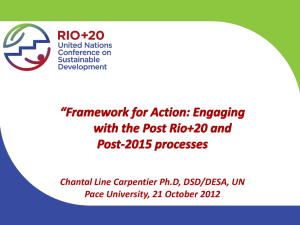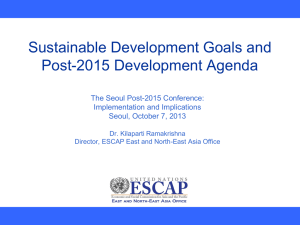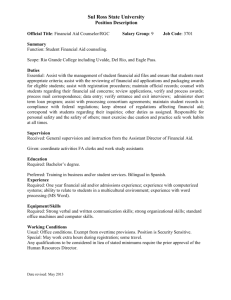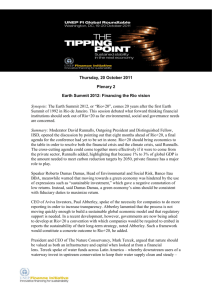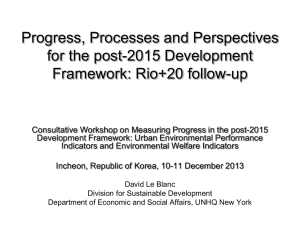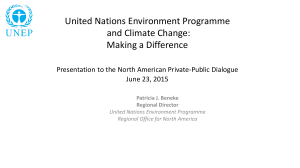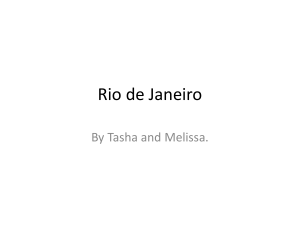Description of Assignment (DOA) - English
advertisement
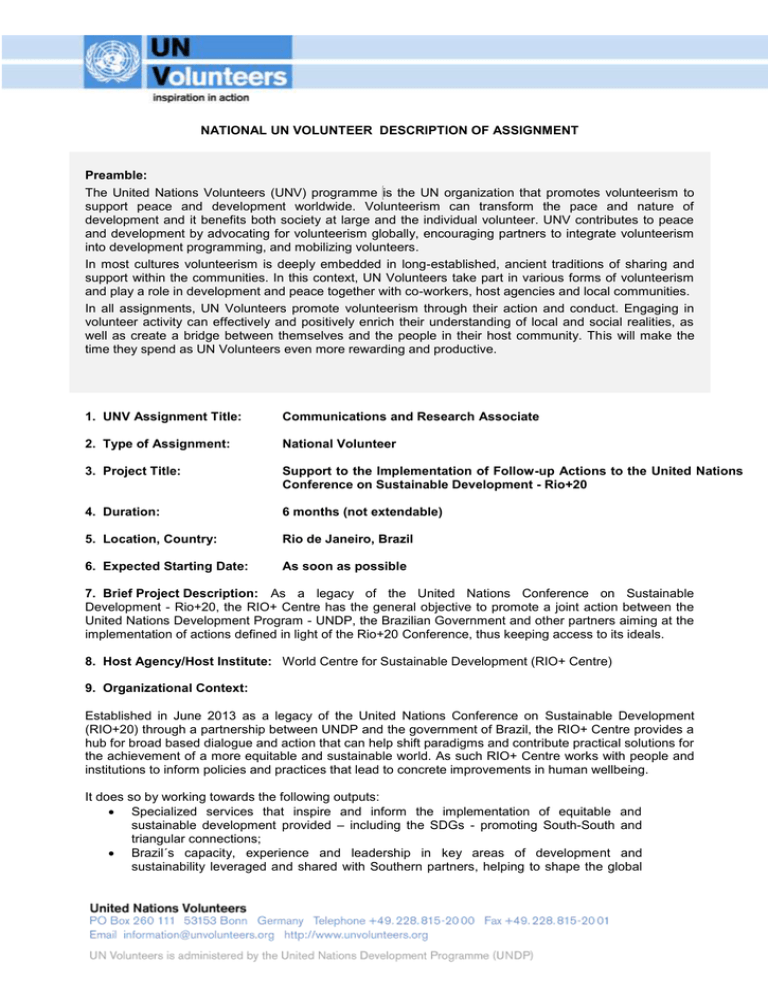
NATIONAL UN VOLUNTEER DESCRIPTION OF ASSIGNMENT Preamble: The United Nations Volunteers (UNV) programme is the UN organization that promotes volunteerism to support peace and development worldwide. Volunteerism can transform the pace and nature of development and it benefits both society at large and the individual volunteer. UNV contributes to peace and development by advocating for volunteerism globally, encouraging partners to integrate volunteerism into development programming, and mobilizing volunteers. In most cultures volunteerism is deeply embedded in long-established, ancient traditions of sharing and support within the communities. In this context, UN Volunteers take part in various forms of volunteerism and play a role in development and peace together with co-workers, host agencies and local communities. In all assignments, UN Volunteers promote volunteerism through their action and conduct. Engaging in volunteer activity can effectively and positively enrich their understanding of local and social realities, as well as create a bridge between themselves and the people in their host community. This will make the time they spend as UN Volunteers even more rewarding and productive. 1. UNV Assignment Title: Communications and Research Associate 2. Type of Assignment: National Volunteer 3. Project Title: Support to the Implementation of Follow-up Actions to the United Nations Conference on Sustainable Development - Rio+20 4. Duration: 6 months (not extendable) 5. Location, Country: Rio de Janeiro, Brazil 6. Expected Starting Date: As soon as possible 7. Brief Project Description: As a legacy of the United Nations Conference on Sustainable Development - Rio+20, the RIO+ Centre has the general objective to promote a joint action between the United Nations Development Program - UNDP, the Brazilian Government and other partners aiming at the implementation of actions defined in light of the Rio+20 Conference, thus keeping access to its ideals. 8. Host Agency/Host Institute: World Centre for Sustainable Development (RIO+ Centre) 9. Organizational Context: Established in June 2013 as a legacy of the United Nations Conference on Sustainable Development (RIO+20) through a partnership between UNDP and the government of Brazil, the RIO+ Centre provides a hub for broad based dialogue and action that can help shift paradigms and contribute practical solutions for the achievement of a more equitable and sustainable world. As such RIO+ Centre works with people and institutions to inform policies and practices that lead to concrete improvements in human wellbeing. It does so by working towards the following outputs: Specialized services that inspire and inform the implementation of equitable and sustainable development provided – including the SDGs - promoting South-South and triangular connections; Brazil´s capacity, experience and leadership in key areas of development and sustainability leveraged and shared with Southern partners, helping to shape the global discourse on SD implementation; A knowledge hub that brings together information, analysis and perspectives for the acceleration of SDG achievements at the national, sub-national and international level; SDG policy dialogue among key national and international actors (including central and subnational government authorities, the private sectors, civil society, academia, international organizations, and other interested stakeholders) generated and convened; Key actors in the South supported and strengthened in their efforts to accelerate the delivery of national and international SDG commitments. The newly adopted SDGs (which include 17 targets and 169 goals, with indicators under technical expert consultation to be issued in the first half of 2016) are intended to guide policies and drive actions on a range of sustainability issues. The SDGs provide a coherent and integrated basis for the further development and implementation of sub national and national sustainability strategies. Efforts to deliver the global goals will have huge implications on how we design and implement policies, and in particular social policies. Sectoral and silo-based planning approaches have demonstrated their inadequacy to address complex global and national Sustainable Development challenges whose interdependencies and linkages transcend individual sector and national borders. The 2030 agenda warrant more attention to the 3 pillars of development (social, economic & environment) to shape the global remit for social, economic and environmental development. To help countries implement the SDGs and the 2030 agenda, UNDP's role is championing the SDGs, localizing the SDG agenda under the MAPS initiative (mainstreaming, acceleration, and policy support) and acting as a scorekeeper by assisting countries to keep track of their progress on the SDGs. The RIO+ Centre is an operational arm of UNDP and positioning its self as a Centre of reference to help organization and UN system deliver the SDGs and the 2030 agenda with a multidisciplinary team. 10. Type of Assignment Place: Assignment with family 11. Description of tasks: Under the direct supervision of the RIO+ Centre Deputy Director, the UN Volunteer will contribute to the above-mentioned outputs, and other related functions are: Policy development, research and program support delivery (40%) Support the Centre’s work in developing and implementing coherent sustainable development policies in coordination with regional bureaus and UNDP Country Offices (COs), to inspire and inform governmental, private sector and non-state organization policies and attitudes that lead to greater social, environmental and economic justice; Assist the RIO+ Centre in the development, preparation and implementation of a set of guidelines, templates and other tools and instruments that will facilitate countries’ planning – and implementation of the SDGs and the 2030 agenda; Support policy-relevant research to assist policymakers in understanding the SDGs and the 2030 Agenda; Provide technical support for the development and implementation of SD programs; Assist the Centre in implementing its global strategy. Communication and advocacy (25%) Assist the Centre in implementing its communication and advocacy strategy; Assist in producing appealing and well written publications and reports such as policy-related reports on the SDGs; progress reports; annual reports; and other relevant publications; Support the RIO+ Centre in developing communication materials around the SDGs and the 2030 Agenda; Support the communication in writing stories and liaising with other partners to get information on the SDGs; Support the RIO+ in developing platforms for communication and knowledge sharing. Overall support to management (20%) Support the Director, Deputy Director and other policy specialists in any other task that can be reasonably requested from a policy analyst within the Centre; Support the Centre in convening people and ideas on the SDGs and the 2030 Agenda, facilitating south -south and triangular cooperation’s, organizing meetings and seminars to trigger the debate and dialogue around the SDGs. Corporate policy development support (15%) Contribute to UNDP’s global development policy advisory functions in shaping the global thought leadership by providing evidence-based support and development analytics on the SDGs and the 2030 Agenda when required; Through the RIO+ Centre, provide support to BPPS teams and regional bureaus in assisting countries to deliver on the SDG agenda. Furthermore, the UN Volunteer are encouraged to: Strengthen their knowledge and understanding of the concept of volunteerism by reading relevant UNV and external publications and take active part in UNV activities (for instance in events that mark IVD); Be acquainted with and build on traditional and/or local forms of volunteerism in the host country; Reflect on the type and quality of voluntary action that they are undertaking, including participation in ongoing reflection activities; Contribute articles/write-ups on field experiences and submit them for UNV publications/websites, newsletters, press releases, etc.; Assist with the UNV Buddy Programme for newly-arrived UN Volunteers; Promote or advise local groups in the use of online volunteering, or encourage relevant local individuals and organizations to use the UNV Online Volunteering service whenever technically possible. 12. Results/Expected Outputs: Sustainable development policies and programs developed and implementation commenced; Efficient, timely, responsive and high quality support rendered to RIO+ Centre team in accordance to its goals and functions; A final statement of achievements towards volunteerism for development during the assignment, such as reporting on the number of volunteers mobilized, activities participated in and capacities developed. 13. Qualifications/Requirements: Education: Experience: Master’s Degree or equivalent in International Development, Political Science, Sustainable development, Agro-Economist, Social Science or other related field of expertise A minimum of two years of relevant work experience in the relevant development discipline. Experience in international corporation work, International NGOs, UN, MDGs/SDG experience is an advantage. Experience in policy design, development and/or implementation an asset Language Requirements: Other requirements Competencies Experience in advocacy with state and non-state actors an advantage Fluency in both Portuguese and English, including excellent writing skills. Candidates must be Brazilian nationals or legal residents in Brazil or legal residents in Brazil with the status of refugee or being stateless. Core competencies: • Ethics & Values • Working in Teams • Communicating Information & Ideas • Self-management & Emotional intelligence Functional competencies: • Advocacy/Advancing A Policy-Oriented Agenda • Identifies and communicates relevant information for a variety of audiences for advocating UNDP’s mandate Results-Based Policy Development: • Analyzes a country situation to identify opportunities for policy development Promoting Organizational Learning and Knowledge Sharing: • Generates new ideas and approaches, researches best practices and proposes new, more effective ways of doing things • Documents and analyses innovative strategies and new approaches Global Leadership and Advocacy for UNDP’s Goals • Identifies and communicates relevant information for advocacy for UNDP’s goals for a variety of audiences • Identifies and takes advantage of opportunities for advocating for UNDP’s mandate Client Orientation • Researches potential solutions to internal and external client needs and reports back in a timely, succinct and appropriate fashion • Organizes and prioritizes work schedule to meet client needs and deadlines • Anticipates client needs and addresses them promptly 14. Living Conditions: Overview Brazil is South America's leading economic power and a regional leader, one of the first in the area to begin an economic recovery. Portuguese is the country’s official language. Highly unequal income distribution and crime remain pressing problems. Rio de Janeiro, often referred to as simply Rio, is the capital of the State of Rio de Janeiro, the second largest city of Brazil, and the third largest metropolitan area and agglomeration in South America, boasting approximately 6.3 million people within the city proper, making it the 6th largest in the Americas, and 26th in the world. As the main gateway to Brazil, it has experienced a booming tourist industry, recently welcoming an unprecedented number of visitors. Part of the city has been designated as a World Heritage Site, named "Rio de Janeiro: Carioca Landscapes between the Mountain and the Sea", identified by UNESCO on 1 July 2012 in the category Cultural Landscape. Rio de Janeiro is Brazil's primary tourist attraction and resort. It receives the most visitors per year of any city in South America with 2.82 million international tourists a year. The city sports world-class hotels, approximately 80 kilometers of beach land, and the famous Corcovado and Sugarloaf mountains. Rio de Janeiro has been rated “Critical” for crime by the State Department for the past 25 years. Crime statistics for 2012 reflect continued critically high and rising levels of crimes in both the state and city of Rio de Janeiro in the categories of robbery, rape, fraud, and residential thefts. While crime rates remain at critical levels, the homicide rate continues to fall. The most common forms of crime affecting tourists are pick pockets and street muggings. However, kidnapping (other than express-kidnapping) is not an issue like it is reported to be in some other Latin American countries. In the past, the security risk was higher than it is today and police protection has improved significantly in Zona Sul (Copacabana, Ipanema, Leblon, Lagoa, Jardim Botanico) and Barra da Tijuca in the last two years. Today, although the likelihood of experiencing crime in Rio has diminished, it still exists. It has to be said that much of the crime that occurs is opportunistic crime. Meaning that criminals focus more on those they think are easy or high-value targets. For example, the elderly, someone walking alone at night, or someone wearing lots of jewelry. Climate The entire State of Rio is located in the tropical zone (the Capricorn Tropic Line is just a few degrees south of Rio); so, predominant climate is tropical, with local changes due to altitude. In the city of Rio and neighborhoods, average temperature is 24 degrees Celsius, and rainfall is about 1,250 mm per year, in particular from December to March. In inland areas of the city, temperatures above 40 °C (104 °F) are common during the summer, though rarely for long periods, while maximum temperatures above 27 °C (81 °F) can occur on a monthly basis. Transport The city has major roads to all neighboring states, and the highways have seen a significant improvement over recent years. There are two important airports in Rio. The International Airport Tom Jobim handles international and long distance national flights; the Airport Santos Dumont receives domestic flights, mostly from nearby cities like São Paulo and Belo Horizonte. The city of Rio has the largest rail grid in Brazil, where trains are used both to long journeys (reaching Espirito Santo and Minas Gerais) and for urban transportation, used massively by the poor population. Housing Leases are commonly negotiated through a housing agency. A rent contract usually requires two guarantors or three-months advanced rent. The tenant is responsible for real estate tax, housing insurance, maintenance fees and general repairs including repainting. The lease is usually for one year. Although they are normally signed for a renewable one-year period, housing leases often include a diplomatic clause that facilitates the termination of the contract in case of transfer. All apartments and houses have ample sanitary facilities, showers and/or baths, separate quarters for the domestic, washing machine connections and electrical outlets (110 Volts). It should be noted that electric appliances are widely available. There are Portuguese-language radio and color television stations in Rio with a good selection of programs and with satisfactory national and international news coverage. All principal Brazilian newspapers are available, although the supply of foreign newspapers is irregular and expensive, thus anyone interested in receiving such publications regularly is advised to subscribe. 15. Conditions of Service: This is a 6 months contract. Travel to duty station (if applicable) and a Settling-In-Grant will be provided in the event duty station is not within commuting distance from the place of recruitment. A Volunteer Living Allowance (VLA) of R$ 2.951,58 is provided monthly to cover housing, utilities and normal cost of living expenses. Life, health and permanent disability insurance are included (health insurance for up to 3 dependents), as well as final repatriation (if applicable) and resettlement allowance for satisfactory service. ____________________________________________________________________________________ Please note that only shortlisted candidates will be contacted. Please also note this is a National UN Volunteer post. National UN Volunteers must be one of the following: i. nationals of the Programme Country; ii. legally resident in the Programme Country or territory with the status of refugee; or iii. legally resident in the Programme Country or territory with the status of being stateless. National UN Volunteers have to be at least 22 years of age. UNDP and UNV give equal opportunity to all applicants and particularly encourage Afro-Brazilians and women to apply. Deadline for applications: 3th March 2016. Please send your CV in English with the Subject - Communications and Research Associate – Your Name to: monica.villarindo@undp.org
